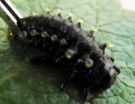But a team of Battelle researchers at the Department of Energy's Pacific Northwest National Laboratory has discovered a method that could dramatically cut the amount of heat needed during processing, reducing the amount of energy needed during a key processing step by at least 10 percent. The research team believes the discovery could ultimately lead to a more cost-effective way of tapping into extremely "sour" natural gas reserves – those reserves that contain significant amounts of hydrogen sulfide and that may not have been economically viable to tap up to this point. Battelle operates the Pacific Northwest National Laboratory for DOE.
The researchers lay out the more efficient process and suggest how it could be applied to processing raw natural gas in the March 11 online issue of the journal Energy and Environmental Science.
Raw natural gas is purified in a process called "sweetening" before it can safely be used as a fuel. Thermal Swing Regeneration is a common industry process used for sweetening natural gas. In that process, chemical sponges called sorbents remove toxic and flammable gases, such as rotten-egg smelling hydrogen sulfide from natural gas.
The gas must first be treated with a solution of chemical sorbents that are dissolved in water. That solution must then be heated up and boiled to remove the hydrogen sulfide, in order to prepare the sorbent for future use. Once the hydrogen sulfide is boiled off, the sorbent is then cooled and ready for use again. The repeated heating and cooling requires a lot of energy and markedly reduces the efficiency of the process, scientists say.
The new, Battelle-created process called Antisolvent Swing Regeneration takes advantage of hydrogen sulfide's ability to dissolve better in some liquids than others at room temperatures. In this process, the hydrogen sulfide "swings" between different liquids during the processing at nearly room temperature, resulting in its removal, in just a few steps, from liquids that can be reused again and again.
"Because hydrogen sulfide is such a common contaminant in methane, natural gas processors could potentially use this method in the sweetening process, reducing their energy use and saving money on the cost of sorbent materials," said Phillip Koech, lead author and senior research scientist.
In the new work, Koech and colleagues tested how well they could swing hydrogen sulfide through a series of processing liquids without using water or heat. They began with a substance known as a recyclable binding organic liquid that could hold onto hydrogen sulfide without the addition of water.
First, they dissolved hydrogen sulfide in several different recyclable binding organic liquids and found that nearly all of them could hold the chemical without added water. They found one -- DMEA -- that could hold the most hydrogen sulfide. A chemical analysis suggested that hydrogen sulfide forms a salt with DMEA, turning the DMEA from an oily liquid into something more like salty water, but not water at all.
Based on the chemical characteristics of the salty DMEA, the team thought the salt could be easily disrupted and turned back into the gas hydrogen sulfide by adding a liquid hydrocarbon called an alkane. First, they mixed the hydrogen sulfide-containing DMEA with the alkane known as hexane and shook it like a bottle of salad dressing. Most of the hydrogen sulfide returned to its gaseous nature and bubbled out of the mix, leaving a soup of DMEA and hexane.
Having successfully removed the hydrogen sulfide from the DMEA, the team needed to find an alkane that would separate the hexane and the DMEA, and found one in hexadecane, which separates from DMEA in the same way that oil and vinegar drift apart in salad dressing. The team suggested the components separated due to a bit of salt left in the DMEA.
However, unlike hexane's ability to perform at room temperature, the team had to warm the DMEA-hexadecane just a little -- to about 40 degrees Celsius (104 degrees Fahrenheit), the temperature of a hot summer day -- to get the liquids to release the hydrogen sulfide. After the gas bubbled off and the two liquids separated, the team could pour off the hexadecane and re-use the left over DMEA.
Lastly, the researchers tested how well the chemicals could be re-used by recycling the hydrogen sulfide through the DMEA and hexadecane five times. The liquids retained their ability to remove the hydrogen sulfide and recover the DMEA in its initial form. The team expects DMEA will be able to pull hydrogen sulfide from natural gas using this process and they expect to scale up the process with future research.
This chemical process, called a polarity swing, occurs naturally at nearly room temperature, drastically reducing the need for heat during sweetening. Scientists estimate this method could cut the amount of energy needed to complete the sweetening process by at least 10 percent.
In addition to energy savings, scientists say there are other potential benefits of using Antisolvent Swing Regeneration.
"Applying ASSR to natural gas sweetening could result in a more environmentally friendly process because hexadecane is non-toxic," said David Heldebrant, corresponding author and project manager.
"We also anticipate chemical sorbents could last longer because they are not subjected to repeated heating and cooling, which degrade the sorbent."
Battelle's Independent Research and Development fund supported this work. Patents are pending on this technology and it is now available for licensing worldwide.
INFORMATION:
Reference: Phillip K. Koech, James E. Rainbolt, Mark D. Bearden, Feng Zheng, David J. Heldebrant, Chemically Selective Gas Sweetening Without Thermal-Swing Regeneration, Energy Environ. Sci., doi: 10.1039/c0ee00839g
About Battelle
As the world's largest, independent research and development organization, Battelle provides innovative solutions to the world's most pressing needs through its four global businesses: Laboratory Management; National Security; Health and Life Sciences; and Energy, Environment and Material Sciences. It advances scientific discovery and application by conducting $6.5 billion in global R&D annually through contract research, laboratory management and technology commercialization.
About PNNL
Pacific Northwest National Laboratory is a Department of Energy Office of Science national laboratory where interdisciplinary teams advance science and technology and deliver solutions to America's most intractable problems in energy, the environment and national security. PNNL employs 4,900 staff, has an annual budget of nearly $1.1 billion, and has been managed by Ohio-based Battelle since the lab's inception in 1965. Follow PNNL on Facebook, LinkedIn and Twitter.
END


